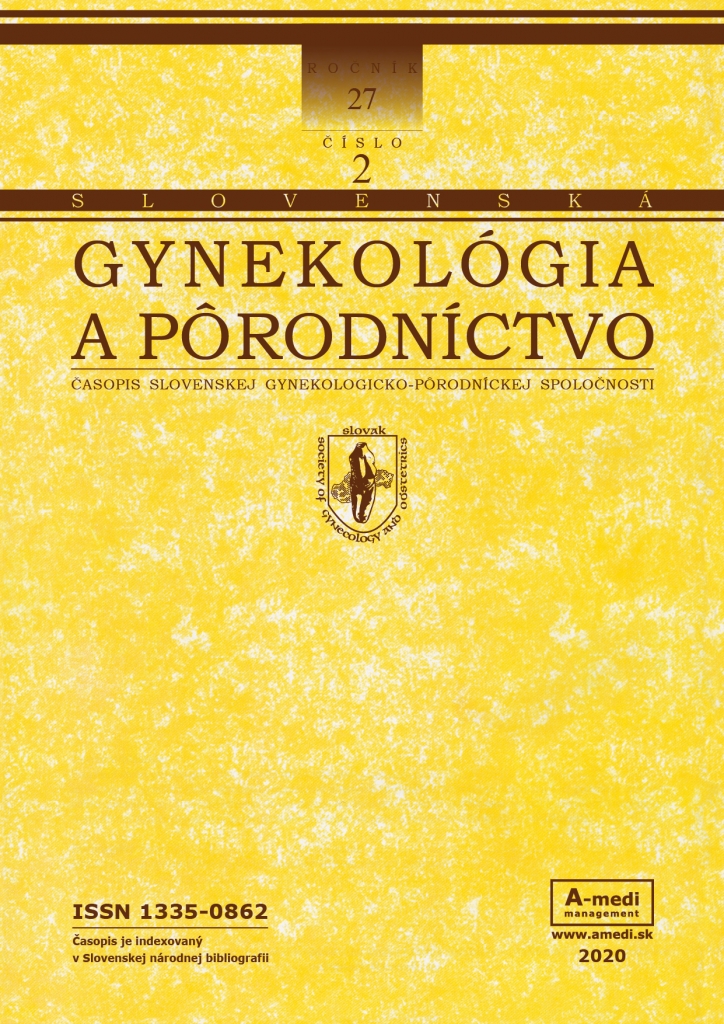
Slovak Gynecology and Obstetrics
- Článok
- Obsah 4/2017
- Archív
- Voľne dostupné články
- Redakčná rada
- Pokyny pre autorov
- Autodidaktické testy
Téma: Original works
ANALYSIS OF CIRCULATING TUMOUR DNA IN PATIENTS WITH BREAST CANCER – PILOT STUDY
K. Zelinová, M. Jagelková, Z. Laučeková, M. Grendár, K. Dókuš
The breast cancer is the most commonly diagnosed cancer in the world and is the leading
cause of cancer deaths among women. Genomic sequencing provides the opportunity
for a deeper understanding of the cancer biology and allows the identification
of tumour-specific genomic changes that have potential to be used in the diagnosis
and therapy of malignancies. The sequential examination of free circulating tumour
DNA (ctDNA) provides comprehensive information on genetic changes in a primary
tumour, its metastases, and can identify new mutations that originate during oncological
treatment. We detected somatic gene mutations with a pathogenic effect in
patients with breast cancer, with the TP53 and FBXW7 being the most frequently affected
genes. In most cases, these changes were single nucleotide substitutions with
a missense mutation effect.
Ročník 2017 Témy časopisu Slovak Gynecology and Obstetrics 4 / 2017
Original works
Case study
doc. MUDr. Martin Redecha, PhD.
EDITORIAL BOARD
prof. MUDr. Miroslav Borovský, CSc.
prof. MUDr. Ján Danko, CSc.
prof. MUDr. Karol Holomáň, CSc.
MUDr. Ľudovít Janek
prof. MUDr. Štefan Lukačín, PhD.
prof. MUDr. Miloš Mlynček, CSc.
prof. MUDr. Ján Štencl, CSc.
doc. MUDr. Ivan Hollý, CSc.
doc. MUDr. Miroslav Korbeľ, CSc.
doc. MUDr. Jozef Višňovský, PhD.
doc. MUDr. Pavol Žúbor, DrSc.
doc. MUDr. Igor Rusňák, PhD.
MUDr. Jozef Adam
MUDr. Tibor Bielik, PhD.
PUBLISHER
Slovenská gynekologicko-pôrodnícka spoločnosť
Adresa: Antolská 11, 851 07 Bratislava
IČO 31802800, DIČ 2021515243
telefón-fax: 02/68 67 2 725
e-mail: slovenskagynekologia@gmail.com
EDITORIAL OFFICE OF JOURNAL
A-medi management, s. r. o.
Kupeckého 3,821 08 Bratislava
IČO: 44057717
telefón-fax: 02/55 64 72 47
e-mail: amedi@amedi.sk, www.amedi.sk
EDITOR-IN-CHIEF
Ing. Danica Paulenová
e-mail: paulenova@amedi.sk
GRAPHIC LAYOUT AND TYPESETTING
Lucia Vecseiová
e-mail: dtp@amedi.sk
MARKETING MANAGER
Ing. Dana Lakotová
mobil: 0903 224 625
e-mail: marketing@amedi.sk
LANGUAGE PROOFREADING
Mgr. Eva Doktorová
PROOFREADING OF ENGLISH TEXTS
Mgr. Jana Bábelová
ECONOMY AND SUBSCRIPTIONS
Ing. Mária Štecková
telefón: 02/55 64 72 48
mobil: 0911 117 949
e-mail: ekonom@amedi.sk

